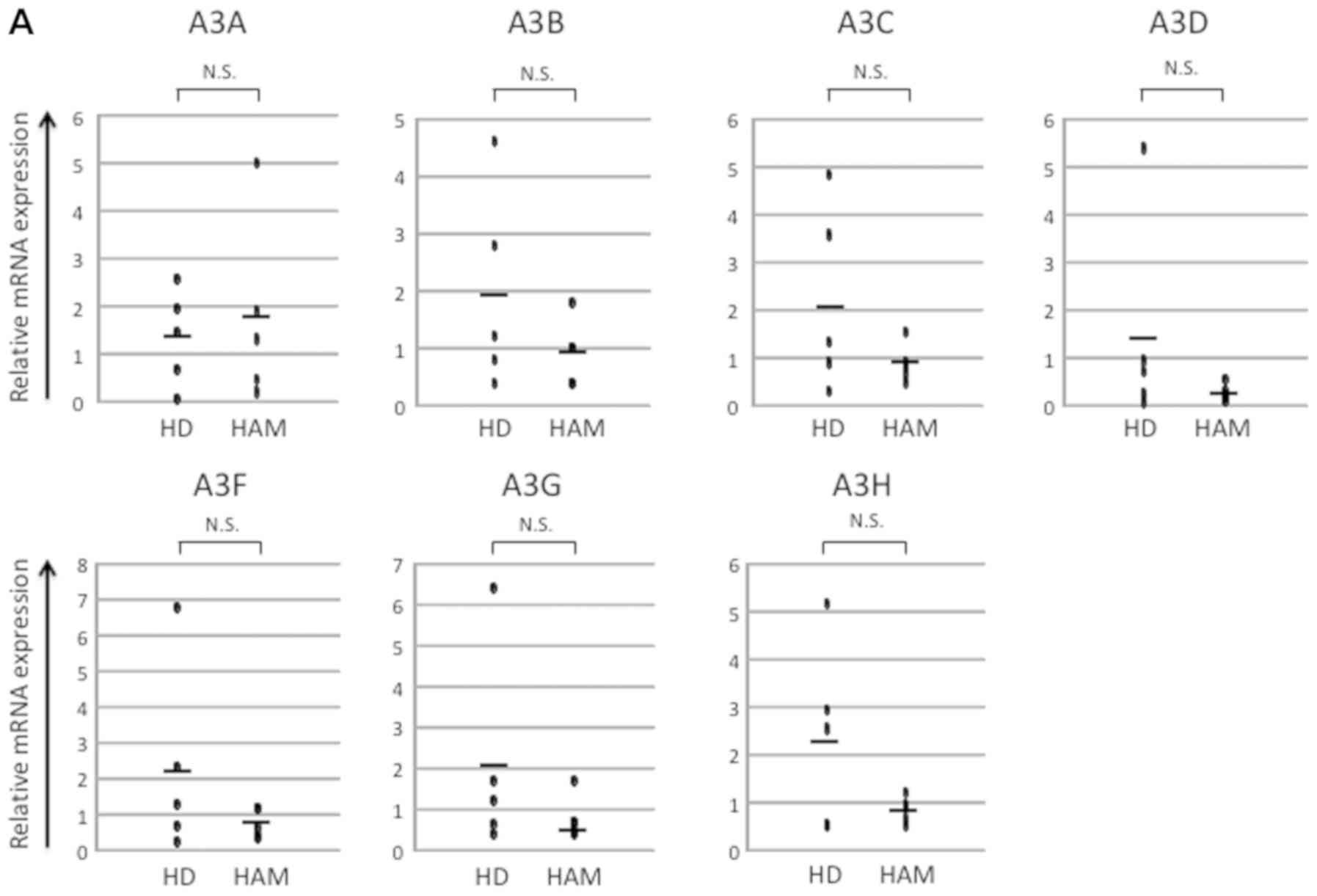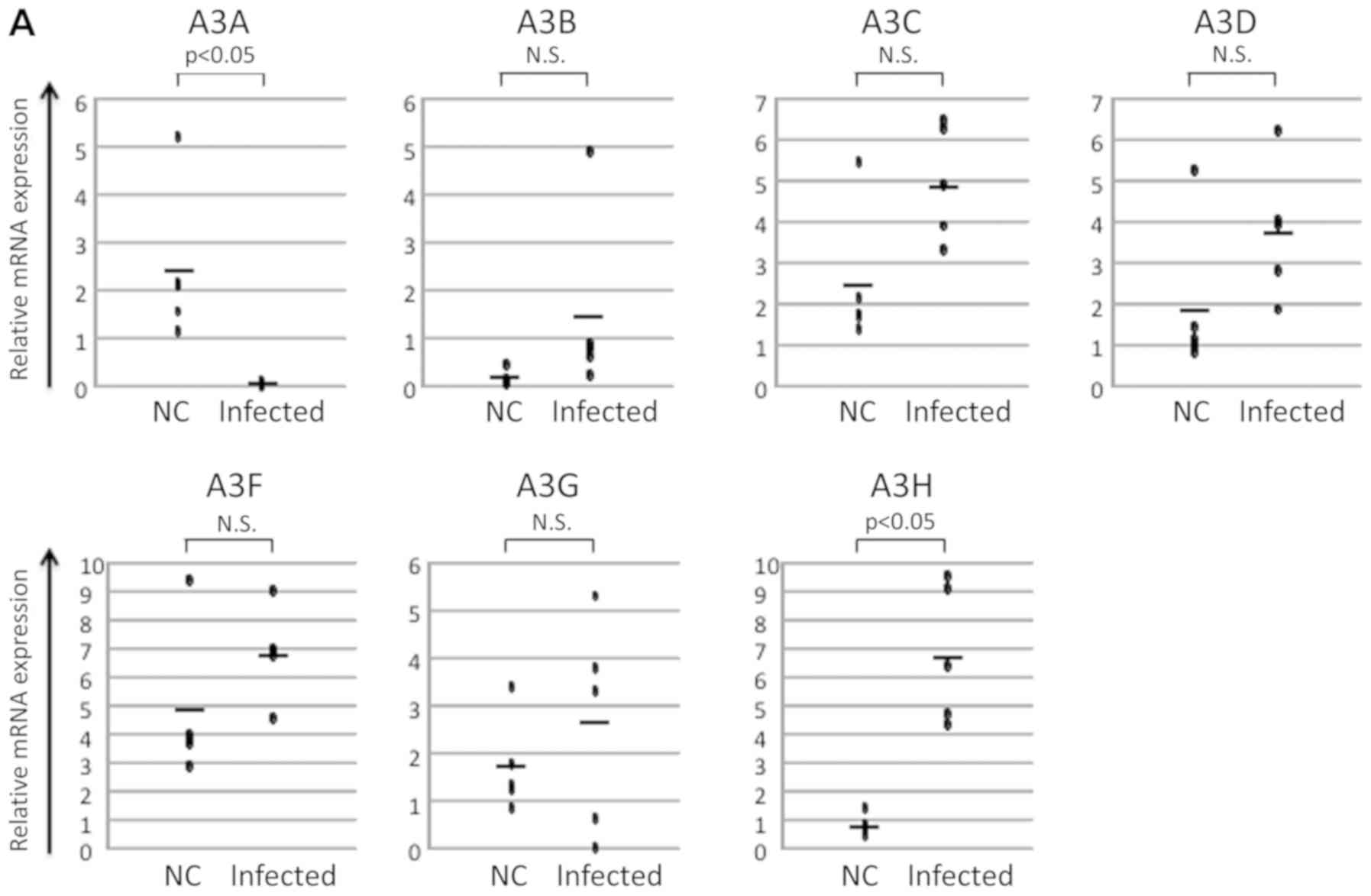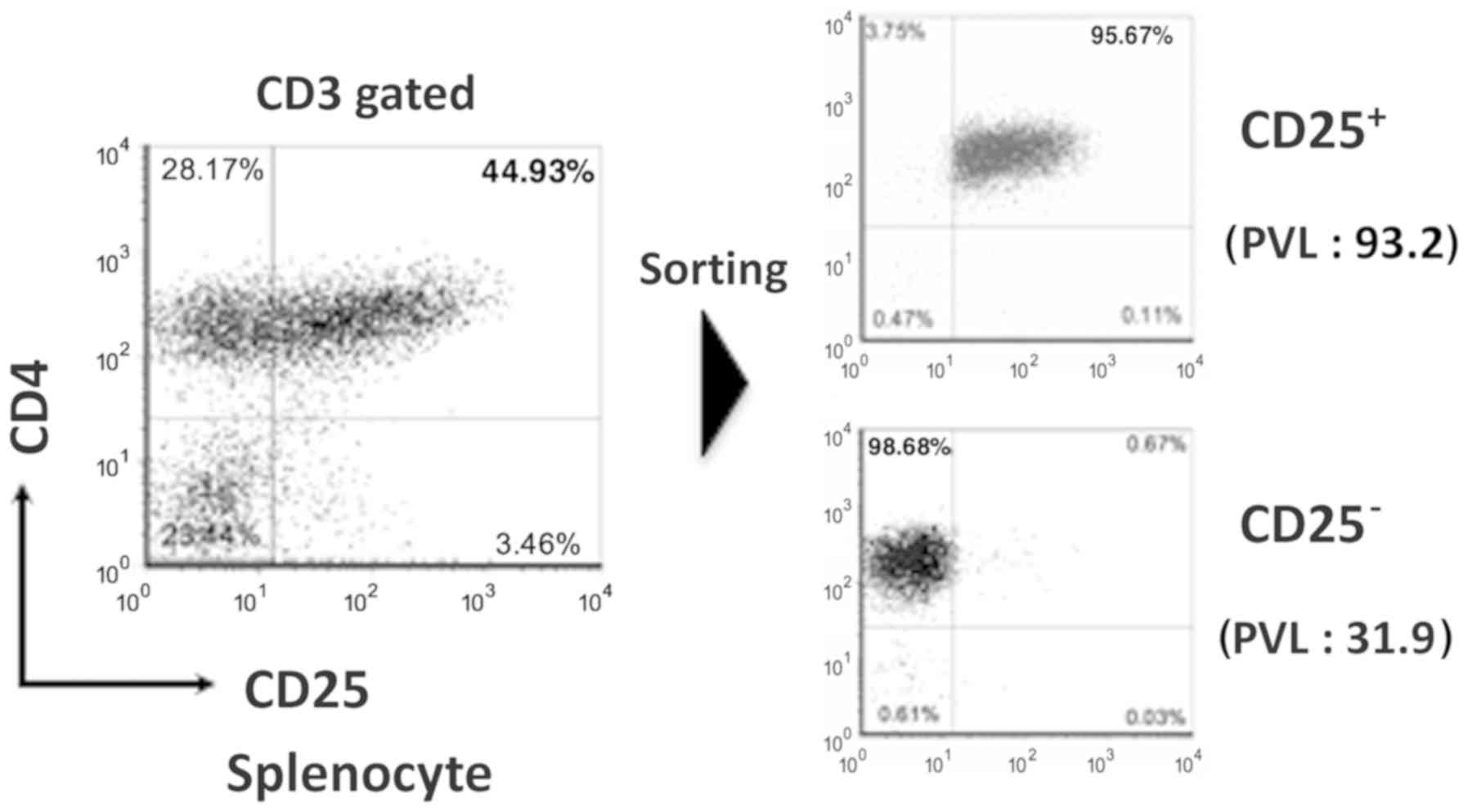|
1
|
Uchiyama T, Yodoi J, Sagawa K, Takatsuki K
and Uchino H: Adult T-cell leukemia: Clinical and hematologic
features of 16 cases. Blood. 50:481–492. 1977.PubMed/NCBI
|
|
2
|
Osame M, Usuku K, Izumo S, Ijichi N,
Amitani H, Igata A, Matsumoto M and Tara M: HTLV-1 associated
myelopathy, a new clinical entity. Lancet. 1:1031–1032. 1986.
View Article : Google Scholar : PubMed/NCBI
|
|
3
|
Nakao K, Ohba N and Matsumoto M:
Noninfectious anterior uveitis in patients infected with human
T-lymphotropic virus type I. Jpn J Ophthalmol. 33:472–481.
1989.PubMed/NCBI
|
|
4
|
Clapham P, Nagy K, Cheingsong-Popov R,
Exley M and Weiss RA: Productive infection and cell free
transmission of human T-cell leukemia virus in a non-lymphoid cell
line. Science. 222:1125–1127. 1983. View Article : Google Scholar : PubMed/NCBI
|
|
5
|
Derse D, Mikovits J, Polianova M, Felber
BK and Ruscetti F: Virions released from cells transfected with a
molecular clone of human T-cell leukemia virus type I give rise to
primary and secondary infections of T cells. J Virol. 69:1907–1912.
1995.PubMed/NCBI
|
|
6
|
Fialkow PJ: Clonal original of human
tumors. Annu Rev Med. 30:135–143. 1979. View Article : Google Scholar : PubMed/NCBI
|
|
7
|
Malim MH: APOBEC proteins and intrinsic
resistance to HIV-1 infection. Philos Trans R Soc Lond B Biol Sci.
364:675–687. 2009. View Article : Google Scholar : PubMed/NCBI
|
|
8
|
Roberts SA, Lawrence MS, Klimczak LJ,
Grimm SA, Fargo D, Stojanov P, Kiezun A, Kryukov GV, Carter SL,
Saksena G, et al: An APOBEC cytidine deaminase mutagenesis pattern
is widespread in human cancers. Nat Genet. 45:970–976. 2013.
View Article : Google Scholar : PubMed/NCBI
|
|
9
|
Burns MB, Temiz NA and Harris RS: Evidence
for APOBEC3B mutagenesis in multiple human cancers. Nat Genet.
45:977–983. 2013. View
Article : Google Scholar : PubMed/NCBI
|
|
10
|
Vartanian JP, Henry M, Marchio A, Suspène
R, Aynaud MM, Guétard D, Cervantes-Gonzalez M, Battiston C,
Mazzaferro V, Pineau P, et al: Massive APOBEC3 editing of hepatitis
B viral DNA in cirrhosis. PLoS Pathog. 6:e10009282010. View Article : Google Scholar : PubMed/NCBI
|
|
11
|
Vartanian JP, Guétard D, Henry M and
Wain-Hobson S: Evidence for editing of human papillomavirus DNA by
APOBEC3 in benign and precancerous lesions. Science. 320:230–233.
2008. View Article : Google Scholar : PubMed/NCBI
|
|
12
|
Albin JS and Harris RS: Interactions of
host APOBEC3 restriction factors with HIV-1 in vivo: Implications
for therapeutics. Expert Rev Mol Med. 12:e42010. View Article : Google Scholar : PubMed/NCBI
|
|
13
|
Tezuka K, Xun R, Tei M, Ueno T, Tanaka M,
Takenouchi N and Fujisawa J: An animal model of adult T-cell
leukemia: Humanized mice with HTLV-1-specific immunity. Blood.
123:346–355. 2014. View Article : Google Scholar : PubMed/NCBI
|
|
14
|
Nie C, Sato K, Misawa N, Kitayama H,
Fujino H, Hiramatsu H, Heike T, Nakahata T, Tanaka Y, Ito M and
Koyanagi Y: Selective infection of CD4+ effector memory
T lymphocytes leads to preferential depletion of memory T
lymphocytes in R5 HIV-1-infected humanized NOD/SCID/IL-2Rgammanull
mice. Virology. 394:64–72. 2009. View Article : Google Scholar : PubMed/NCBI
|
|
15
|
Salter JD, Bennett RP and Smith HC: The
APOBEC protein family: United by structure, divergent in function.
Trends Biochem Sci. 41:578–594. 2016. View Article : Google Scholar : PubMed/NCBI
|
|
16
|
Yoshida M, Suzuki T, Fujisawa J and Hirai
H: HTLV-1 oncoprotein tax and cellular transcription factors. Curr
Top Microbiol Immunol. 193:79–89. 1995.PubMed/NCBI
|
|
17
|
Furuta RA, Sugiura K, Kawakita S, Inada T,
Ikehara S, Matsuda T and Fujisawa J: Mouse model for the
equilibration interaction between the host immune system and human
T-cell leukemia virus type 1 gene expression. J Virol.
76:2703–2713. 2002. View Article : Google Scholar : PubMed/NCBI
|
|
18
|
Yamano Y, Cohen CJ, Takenouchi N, Yao K,
Tomaru U, Li HC, Reiter Y and Jacobson S: Increased expression of
human T lymphocyte virus type I (HTLV–I) Tax11-19 peptide-human
histocompatibility leukocyte antigen A*201 complexes on
CD4+CD25+ T cells detected by
peptide-specific, major histocompatibility complex-restricted
antibodies in patients with HTLV-1-associated neurologic disease. J
Exp Med. 199:1367–1377. 2004. View Article : Google Scholar : PubMed/NCBI
|
|
19
|
Sasaki H, Nishikata I, Shiraga T, Akamatsu
E, Fukami T, Hidaka T, Kubuki Y, Okayama A, Hamada K, Okabe H, et
al: Overexpression of a cell adhesion molecule, TSLC1, as a
possible molecular marker for acute-type adult T-cell leukemia.
Blood. 105:1204–1213. 2005. View Article : Google Scholar : PubMed/NCBI
|
|
20
|
Araki K, Harada K, Nakamoto K, Shiroma M
and Miyakuni T: Clinical significance of serum soluble IL-2R levels
in patients with adult T cell leukaemia (ATL) and HTLV-1 carriers.
Clin Exp Immunol. 119:259–263. 2000. View Article : Google Scholar : PubMed/NCBI
|
|
21
|
Henderson S and Fenton T: APOBEC3 genes:
Retroviral restriction factors to cancer drivers. Trends Mol Med.
21:274–284. 2015. View Article : Google Scholar : PubMed/NCBI
|
|
22
|
Wang Y, Kinlock BL, Shao Q, Turner TM and
Liu B: HIV-1 Vif inhibits G to A hypermutations catalyzed by
virus-encapsidated APOBEC3G to maintain HIV-1 infectivity.
Retrovirology. 11:892014. View Article : Google Scholar : PubMed/NCBI
|
|
23
|
Guerrero S, Libre C, Batisse J, Mercenne
G, Richer D, Laumond G, Decoville T, Moog C, Marquet R and Paillart
JC: Translational regulation of APOBEC3G mRNA by Vif requires its
5′UTR and contributes to restoring HIV-1 infectivity. Sci Rep.
6:395072016. View Article : Google Scholar : PubMed/NCBI
|
|
24
|
Fan J, Ma G, Nosaka K, Tanabe J, Satou Y,
Koito A, Wain-Hobson S, Vartanian JP and Matsuoka M: APOBEC3G
generates nonsense mutations in human T-cell leukemia virus type 1
proviral genomes in vivo. J Virol. 84:7278–7287. 2010. View Article : Google Scholar : PubMed/NCBI
|
|
25
|
Ooms M, Krikoni A, Kress AK, Simon V and
Munk C: APOBEC3A, APOBEC3B, and APOBEC3H haplotype 2 restrict human
T-lymphotropic virus type 1. J Virol. 86:6097–6108. 2012.
View Article : Google Scholar : PubMed/NCBI
|
|
26
|
Lamb C and Arbuthnot P: Activating the
innate immune response to counter chronic hepatitis B virus
infection. Expert Opin Biol Ther. 16:1517–1527. 2016. View Article : Google Scholar : PubMed/NCBI
|
|
27
|
Cardinaud S, Urrutia A, Rouers A, Coulon
PG, Kervevan J, Richetta C, Bet A, Maze EA, Larsen M, Iglesias MC,
et al: Triggering of TLR-3, −4, NOD2, and DC-SIGN reduces viral
replication and increases T-cell activation capacity of
HIV-infected human dendritic cells. Eur J Immunol. 47:818–829.
2017. View Article : Google Scholar : PubMed/NCBI
|
|
28
|
Kataoka K, Nagata Y, Kitanaka A, Shiraishi
Y, Shimamura T, Yasunaga J, Totoki Y, Chiba K, Sato-Otsubo A, Nagae
G, et al: Integrated molecular analysis of adult T cell
leukemia/lymphoma. Nat Genet. 47:1304–1315. 2015. View Article : Google Scholar : PubMed/NCBI
|
|
29
|
Vieira VC and Soares MA: The role of
cytidine deaminases on innate immune responses against human viral
infections. Biomed Res Int. 2013:6830952013. View Article : Google Scholar : PubMed/NCBI
|
|
30
|
Tajima K: The 4th nation-wide study of
adult T-cell leukemia/lymphoma (ATL) in Japan: Estimates of risk of
ATL and its geographical and clinical features. The T- and B-cell
malignancy study group. Int J Cancer. 45:237–243. 1990. View Article : Google Scholar : PubMed/NCBI
|
|
31
|
Lairmore MD, Silverman L and Ratner L:
Animal models for human T-lymphotropic virus type 1 (HTLV-1)
infection and transformation. Oncogene. 24:6005–6015. 2005.
View Article : Google Scholar : PubMed/NCBI
|
|
32
|
Zou J, Wang C, Ma X, Wang E and Peng G:
APOBEC3B, a molecular driver of mutagenesis in human cancers. Cell
Biosci. 7:292017. View Article : Google Scholar : PubMed/NCBI
|

















